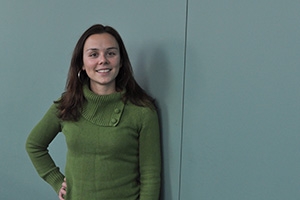Alumni
Career Paths in Development Economics

Before Mario Gonzalez enrolled at AU as a doctoral student in economics, he worked in international development— first, at the Food and Agriculture Organization for a year, and then as a research assistant at the Inter-American Development Bank for two and half years. Everyone, it seemed, had a PhD in economics, he says. Everyone, that is, except Gonzalez.
When he decided it was time to pursue his doctorate, American University was where he wanted to go—all because of Paul Winters, a professor in the Department of Economics. “I took a class with him when I was in the international development master’s program [at AU], and he was the one who recommended me for the position at the Inter-American Development Bank,” he says.
It was Winters, too, who convinced him to go back to school to get formal academic training in economics. When Gonzalez returned to AU as a PhD student in 2010, he knew he wanted Winters involved in his studies. “I wanted him to be the chair of my dissertation committee,” he says.
Leanne Roncolato graduated with a PhD in economics in 2013. She had chosen AU for a similar reason: a professor. “I came to work with the gender program, particularly with Maria Floro,” she says. “Professor Floro is passionate about the human element of economics. She really cares about people.”
Students in AU’s economics doctorate program are all over the map when it comes to their particular areas of interest, but one thing they share is this: the belief that it’s the faculty who make the program what it is.
“The PhD isn’t easy, it’s a lot of work,” Gonzalez says. “But the professors always have their offices open for questions, and they really care about students doing well.”
Roncolato found her dissertation committee to be invaluable. “I was really lucky that all of my committee members had such unique strengths and could support me in different ways.”
For her research on economic development, gender, and employment, for example, she traveled to South Africa to study the informal economy and how small businesses function in the community. “In economics, we often focus on formal labor markets,” she says. “I became really interested in work that isn’t necessarily counted in labor force surveys. That’s something that Professor Floro is really an expert in: shining a focus on other spheres of the economy.”
Roncolato is now looking for an academic teaching position in economics, international development, and women’s studies. She’s continuing her collaboration with a colleague at the International Labor Organization, where she has done policy work in the past. “I always want to have one foot in the policy world,” she says. “And I definitely want to keep doing research on economic development.”
Meanwhile, Gonzalez is pursuing the research lead of his mentor—and committee chair—Paul Winters.
“All of my work is related to impact evaluations, particularly of social and agricultural programs,” he says. He also has a new and more senior position at the Inter- American Development Bank in strategic planning and development effectiveness. “It’s crazy to be getting paid to do what I do,” he says, “because I love what I do.”
